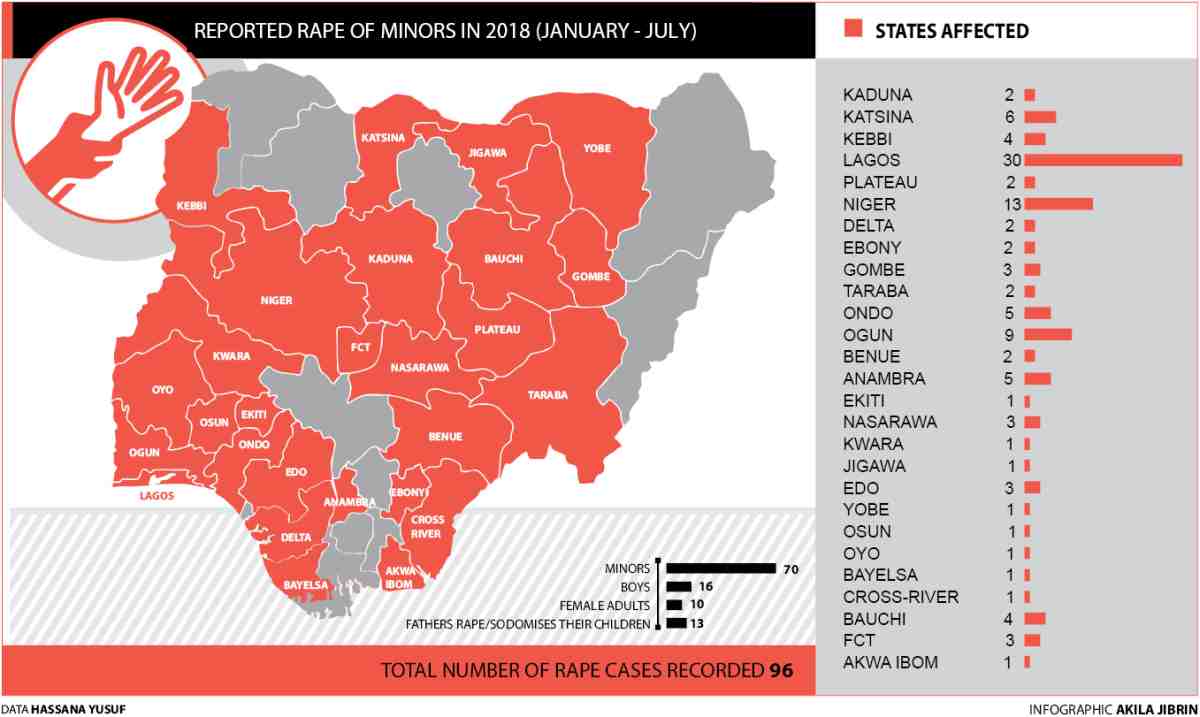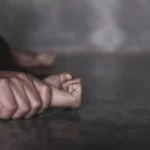As 13 year-old Ochanya Ogbanje, who died from rape-related complications, is buried in Benue, Daily Trust data from reported cases shows that there are nearly 100 children raped within a six-month period. Child right activists think this might be the turning point, but is it?
Friday November 2, dozens of grim faces gathered around a grave in Ogene-Amejo village, Benue State, most of them were dressed in black. Some of them were young and carried placards calling for justice. Some of the black T-shirts were branded with the face of the girl in the medium-sized coffin that was lowered into the red earth.
Her name was Ochanya. She was thirteen when she died on October 17th.
In Makurdi, the Benue State capital, there is outrage over her death. The chairman of Otukpo Local Government, Mr. George Alli decided to name a street after her. But Elizabeth Ochanya Ogbanje did not bargain for this when her hunger for education prompted her to leave her mother and move to Ugbokolo to live with her aunt.
Abused girl, Ochanya, goes home, on course for justice even in death
But instead of getting an education, Ochanya got something else she never bargained for. Her aunt’s husband, Andrew Ogbuja, 52, the Head of Department, Catering and Hotel Management at the Benue State Polytechnic, Ugbokolo, had other ideas for her life.
“When I was eight years old, the son started sleeping with me and when his sister caught him, she reported him to their father and the father scolded him. From there, the father also started sleeping with me,” Ochanya had told a court in August.
The son, her cousin, Victor Inalegwu Ogbuja, a final year student of Animal Production at the Federal University of Agriculture, Makurdi, is now on the run. His father is on trial for the serial rape of Ochanya.
For years Ochanya was raped by the father and son duo. There are allegations of the victim being drugged and threatened until she became ill and was taken to the Hospital for complications related to the abuse earlier in the year. She was diagnosed with Vesicovaginal fistula, VVF. She did not survive.
Ochanya has since become the poster child for the many minors that have been subjected to sexual abuse across the country. There are protests in Makurdi and Abuja calling for justice for her. #Justice for Ochanya is now trending on social media.
Ochanya’s death sparks movement against child abuse
On Tuesday, October 30th a representative of Benue State governor Samuel Ortom while receiving protesters pledged there would be justice for Ochanya.
“I am pained over her death because I also have daughters. What if it were any of them? Indeed, this matter will not be swept under the carpet, the law must take its cause,” the governor’s chief of staff, Mr Terwase Orbunde told protesters from Benue State University who marched to the government house.
There have been countless cases of rape of minors in the countries, most of them go unreported. A Daily Trust data shows there have been 96 reported cases between January and July 2018 and 86 involved children spread across the states of the federation with Lagos State recording the highest number of cases at 30, 17 more than second placed Niger with 13. The gender ratio of the victims is 70 girls to 16 boys. While in 13 cases, the perpetrators were the fathers of the victims, both boys and girls.
Many of these cases will fizzle out of the newspapers and out of the courts. Like that of a 14 year-old Maimuna (not her real name) abducted by a policeman in Asaba and detained and repeatedly raped in Onitsha between October 9th and 14th, 2017. The policeman had found the victim wandering close to her house after she had lost the money she was sent on errand with. The culprit, Corporal Bara’u Garba, husband of two wives and father of several children, was eventually arrested following public outcry after his Divisional Police Officer at Okpoko, Anambra State tried to cover up the case.
Lecturer remanded over defilement, death of 13-yr-old girl
Bara’u has since been dismissed from the force but it seems for now he has escaped justice.
The victim’s uncle Alhaji Lawal Imam, an Asaba-based activist, refused to let the matter die and pushed for Bara’u’s arrest and prosecution.
A year later, a subdued Alhaji Imam told Daily Trust that the case had died. When the question was put to him, his first impulse was to sigh.
“What happened is that Bara’u has been dismissed from the police,” he said. “But in our typical northern fashion he went and mobilized his family members from Sokoto who came all the way to Asaba and pleaded with us to let the matter go. They made a big deal of how repentant he was and how sorry they are. They convinced the girl’s parents. And when I refused to relent, they went to Kano and mobilized my parents who travelled all the way down to Asaba to ask me to let the matter go. When your parents make a plea like that, what else can you do?”
This is not a common occurrence clearly as Mrs Betty Abah, the Executive Director, Centre for Children’s Health Education, Orientation and Protection (CEE-HOPE) said.
“This year alone, in three of the rape cases we handled, the victims’ families backed down, either at the police station levels or in court after so much noise because they were either intimidated by the superior money-power of the suspects or they just don’t trust the disposition of the court to dispense justice for them speedily. And for those three, we even had to fight off police interference. It’s that bad,” she said.
Even the celebrated Ochanya case was not without attempts to sabotage the process. When paraded in court, the suspect, Andrew Ogbuja, had pleaded with the court to consider his standing in society–apart from being a lecturer, he and his wife were knighted by the Catholic Church—and allow him to go home and resolve the matter at the “family level.”
Teenager’s death: Accused lecturer remanded in prison
This was all before Ochanya’s death. And now activists feels this might be the turning point for child victims of sexual abuse. Mrs. Abah certainly thinks so.
“I think Ochanya’s case is a tipping point in the history of Nigeria, [a point] where we all pause and make a collective decision to end sexual violence in the country. The root of the prevalence of these heinous crimes against children and even adults is the laxity of the law enforcement agencies, weak laws, non-enforcement of the current ones, and to a general extent, a lackadaisical judicial system. If perpetrators and potential ones know that the law would descend on them, we would have seen some deterrence,” she said.
But for foremost rape management specialist and forensic expert, Dr. Princess Olufemi-Kayode, the Executive Director, Media Concern for Women and Children (MEDIACON), the law is not the problem.
“Nigeria does not have an issue of law right now in terms of responding [to cases] or the judicial aspect of this cases,” she said. “The challenges we have is the implementation, the system and structure that needs to be in place. A new government may come in today and we won’t know what we are doing anymore. We need a system where if someone is violated they need to know where to go to.”
Dr. Olufemi-Kayode’s NGO keeps a record of cases it treats and says there is a need for a data base of these cases.
“Even the police cannot give us an accurate data on this cases. I have been doing this work for years and I have my data base but these are only for cases that come to me. There are many others doing this work and they have their data as well,” she said.
Since the Daily Trust data was compiled, new cases have made the news. In Maiduguri, a 14 year-old girl displaced by Boko Haram left the Bakasi camp to fetch firewood with her twin sister when an air force officer forced her into the bush and raped her, leaving her bleeding. Humanitarian workers caring for the victim are scared to speak on record as a results of threats they are facing and military authorities have remained mute.
Lecturer remanded in prison for raping teenager
There is an incredibly shocking range to both the victims and the perpetrators. In Nodu Village of Anambra, a pastor, Brother Simon raped a seven-year-old girl while in Anchau, Kaduna, eight men, including an imam raped a 13-year-old on her way to school and gave her N500. The girl is now pregnant with twins.
In Wushisi, Niger State, 50 year-old Mohammed Abdullahi, a carpenter, was arrested for having serially raped four boys between the ages of 10 and 16 over a period of three years. They were all his apprentices.
The perpetrators are both old and young. One of the oldest is a 70-year-old security guard in Olekele, Kwara State. In March, an 11 year-old pupil approached him and asked for a cup of drinking water. He raped her there, within the school premises.
One of the youngest reported victims is a three-year-old girl who was raped by a 63 year old security guard, Olafy Micheal, in Kaduna.
Between May and April something came over 41 year-old Michael Akpan Isaiah of Port Harcourt who raped four of his biological daughters who were between the ages of two and 17.
While in Kano, a school proprietor, Shamsu Nasiru, 28, has been arraigned in court for raping three of his pupils within the school premises. He threatened to kill them if they told anyone.
“Devil pushed me into doing it,” 75-year-old pedophile Mr. Akinlolu Ogunlade, told journalists in Ibadan when paraded by the police for abducting and raping an 11year-old girl for four days.
Nuruddeen Koleosho, also 75, echoed the same words in Ogun when he was arrested for raping an 11 year-old autistic girl in a farm. Fidelis Eze, a pastor in Edo, also echoed the same words. His victim was a six year-old girl.
Most times social and cultural factors come into play to impede justice. Some parents prefer to hush the case so as not to advertise that their children have been tainted. Many of the rapists have sort to explore this to escape punishment from the law.
In 2011, Police Inspectors Dantalle Muhammed and Yusuf Ibrahim abducted a 16-year-old girl in Kano and for days raped her and passed her on to others who also raped her. When the girl was rescued and the culprits arrested, according to a reporter who covered the trial, very influential royals and highly placed people tried to intervene on behalf of the rapist policemen. And only the persistence of rights groups and journalists ensured that the policemen were stripped of their ranks, dismissed from the force and convicted for their crimes. Dantalle Muhammed was sentenced to a total of 24 years imprisonment and a combined fine of N200,000 for three counts of abduction, conspiracy and rape. Yusuf Ibrahim bagged a total of 26 years and a total of N350, 000 for the same three counts while a third police man Mahmuda Muhammad bagged seven years for rape.
That judgment birthed optimism that it could be a turning point in the fight against rape of minors but seven years after, that has not been the case and Dr. Olufemi-Kayode hopes the clamour of justice for Ochanya could turn the tide.
“There are many Ochanya. Her case came out, we can use it to fight for others. But these things have been going on for years,” she said.
When asked what needs to be done to help curb this problem, Dr. Olufemi-Kayode did not even pause to think.
“There has to be serious awareness education The media too has a role to play and there should be emphasis on prevention, and the police, who should be conducting investigations, need to have their own awareness arm and then we have the social welfare arm. We need children from nursery schools to understand certain things. And we need to change our attitude and stop the blame game. How do you blame a 13-year-old or a five-month-old baby for being violated?”
For Mrs. Abah, the police needs to do more.
“The police and judicial system need to wake up from their slumber concerning sexual crimes. The law must be seen to be above all. People of all shades and classes, especially children, must be sensitized to report cases and enforce their rights. We all have the responsibility of protecting the vulnerable people among us. The law has to take on rapists in such a vexed manner and the rest of society has to shame perpetrators in such a profound way that it makes the crime completely unattractive,” she said.
Incidentally, the Nobel Peace Prize this year went to two campaigners against sexual violence, Denis Mukwege and Nadia Murad.
Murad, a Yazidi sex slave survivor, in accepting her Nobel Prize, also places the responsibility of preventing rape on all.
“The world should bear its moral and legal responsibility and ensure its proper and fair accountability. The sexual violence and conflicts in our towns and cities must be stopped,” she said.
On December 10, in Oslo, Norway, Murad and Mukwege will be accepting their prize and shining more light on rape. In Abuja and Makurdi Nigerians will still be clamouring for justice for Ochanya and the many child victims of rape.
Mrs. Abah is very optimistic.
“Yes, I am supremely confident that we will get justice for Ochanya. The case has gone too far to be swept under the carpet. Not only will we get justice for her, but also hers will be the test case, the tipping point and the reference point that will redefine our landscape concerning sexual violence crime in Nigeria,” she said. The optimism is there. Will the results follow?

 Join Daily Trust WhatsApp Community For Quick Access To News and Happenings Around You.
Join Daily Trust WhatsApp Community For Quick Access To News and Happenings Around You.


